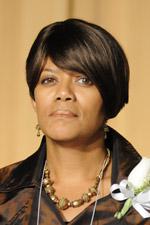Jacklyn Chisholm

Vice President, Planning and Institutional Relations, Rock and Roll Hall of Fame and Museum Alumna, Student Support Services, Case Western Reserve University
I began Case Western Reserve University in the fall of 1977, having graduated from a predominantly African American high school known for its academic excellence, and matriculated to a predominantly white college known for its academic excellence. While I was excited about the possibilities that college presented, I was also afraid because: 1) I had never lived away from home, 2) I had never experienced being a “minority” student before, 3) I knew that my mom could not afford to help me with college, and 4) I was certain that my family would be limited in helping me transition to college because they had not attended one.
Unfortunately, I made the foolish decision to not attend orientation. As a result, my first day of class was my first real experience of the campus. However, I was quickly introduced to the Directors of the Special Services (Student Support Services) program, Ken Wiley and Stella Loeb Munson. They became my surrogate parents and my staunchest supporters during my early years of college. They helped me to better understand my role as a student, including the strategies that I needed to succeed, as well as my responsibility to assist other students through the process.
The lessons learned and the support I received through the program helped keep me moving forward through many trials in my personal life to finally graduating eight years later from CWRU with a Bachelor’s Degree in Medical Anthropology in 1985.
“I am certain that I could not have earned any degrees without the tremendous support—both financial and emotional—and the invaluable mentoring that I received through the SSS program.”
I consider myself extremely blessed; I have been privileged to earn three degrees over a 20-year period: BA, MA in Psychological Anthropology, and a Doctorate in Psychological Anthropology with an emphasis on Educational Anthropology. I am certain, however, that I could not have earned any degrees without the tremendous support—both financial and emotional—and the invaluable mentoring that I received through the SSS program.
My educational and professional journey has been tremendously enriched by my experience in the Special Services program. It is a trite, but true statement: I really don’t know where I would be without their assistance and encouragement, and the program’s funding. It is an honor to be selected as a 2008 TRIO Achiever, as it is equally important to me to champion the TRIO programs now and in the future. The program changed my life as TRIO continues to change the lives of countless others.
